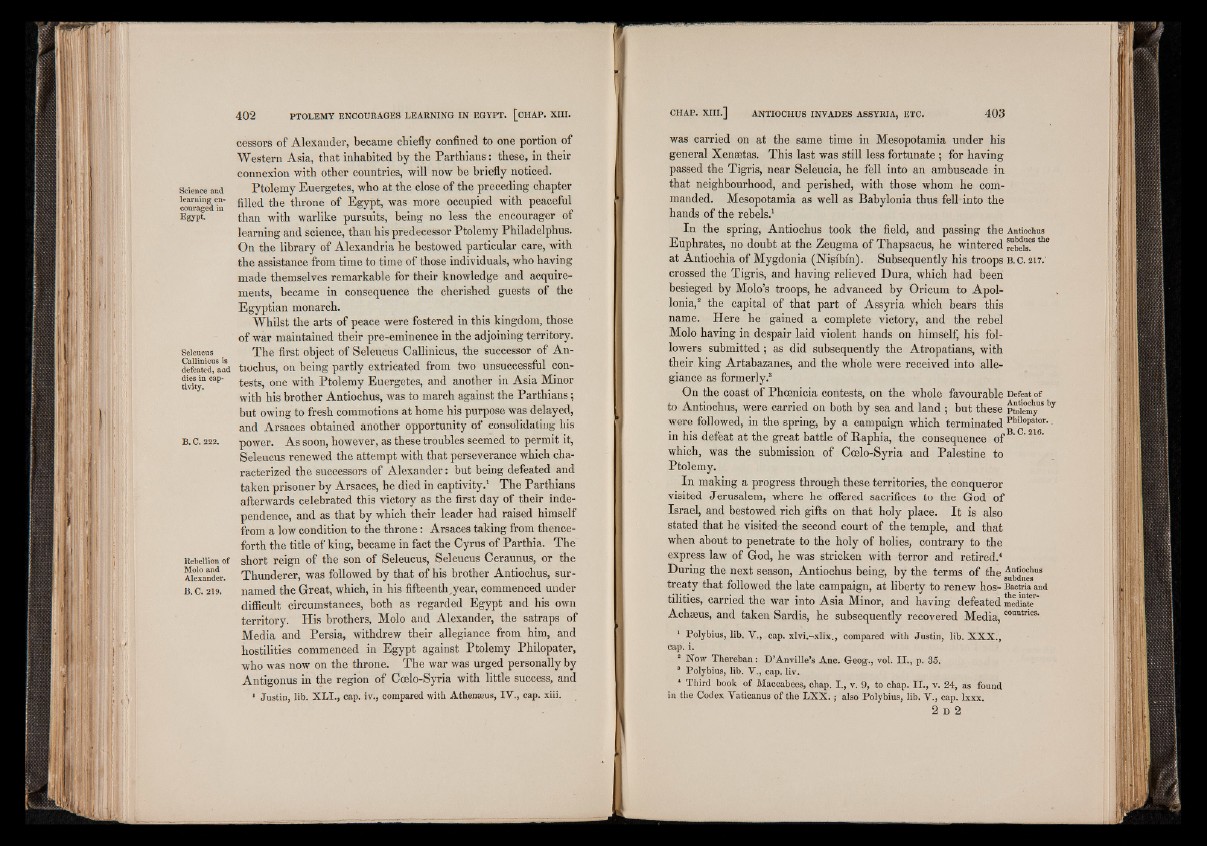
Science and
learning encouraged
in
Egypt.
Seleucus
Callinicus is
defeated, and
dies in captivity.
B. C. 222.
Rebellion of
Molo and
Alexander.
B. C. 219.
cessors of Alexander, became chiefly confined to one portion of
Western Asia, that inhabited by the Parthians: these, in their
connexion with other countries, will now be briefly noticed.
Ptolemy Euergetes, who at the close of the preceding chapter
filled the throne of Egypt, was more occupied with peaceful
than with warlike pursuits, being no less the encourager of
learning and science, than his predecessor Ptolemy Philadelphus.
On the library of Alexandria he bestowed particular care, with
the assistance from time to time of those individuals, who having
made themselves remarkable for their knowledge and acquirements,
became in consequence the cherished guests of the
Egyptian monarch.
Whilst the arts of peace were fostered in this kingdom, those
of war maintained their pre-eminence in the adjoining territory.
The first object of Seleucus Callinicus, the successor of Antiochus,
on being partly extricated from two unsuccessful contests,
one with Ptolemy Euergetes, and another in Asia Minor
with his brother Antiochus, was to march against the Parthians ;
but owing to fresh commotions at home his purpose was delayed,
and Arsaces obtained another opportunity of consolidating his
power. As soon, however, as these troubles seemed to permit it,
Seleucus renewed the attempt with that perseverance which characterized
the successors of Alexander : but being defeated and
taken prisoner by Arsaces, he died in captivity.1 The Parthians
afterwards celebrated this victory as the first day of their independence,
and as that by wbich their leader had raised himself
from a low condition to the throne : Arsaces taking from thenceforth
the title of king, became in fact the Cyrus of Parthia. The
short reign of the son of Seleucus, Seleucus Ceraunus, or the
Thunderer, was followed by that of his brother Antiochus, sur-
named the Great, which, in his fifteenth,year, commenced under
difficult circumstances, both as regarded Egypt and his own
territory. His brothers, Molo and Alexander, the satraps of
Media and Persia, withdrew their allegiance from him, and
hostilities commenced in Egypt against Ptolemy Philopater,
who was now on the throne. The war was urged personally by
Antigonus in the region of Ccelo-Syria with little success, and
' Justin, lib. X L I ., cap. iv., compared with Athenæus, IV ., cap. xiii.
was carried on at the same time in Mesopotamia under his
general Xensetas. This last was still less fortunate ; for having
passed the Tigris, near Seleucia, he fell into an ambuscade in
that neighbourhood, and perished, with those whom he commanded.
Mesopotamia as well as Babylonia thus fell into the
hands of the rebels.1
In the spring, Antiochus took the field, and passing the Antiochus
Euphrates, no doubt at the Zeugma of Thapsacus, he wintered rebels?8 ^
at Antiochia of Mygdonia (Nisibin). Subsequently his troops B.C. 217.'
crossed the Tigris, and having relieved Dura, which had been
besieged by Molo’s troops, he advanced by Oricum to Apol-
lonia,2 the capital of that part of Assyria which bears this
name. Here he gained a complete victory, and the rebel
Molo having in despair laid violent hands on himself, his followers
submitted; as did subsequently the Atropatians, with
their king Artabazanes, and the whole were received into allegiance
as formerly.®
On the coast of Phoenicia contests, on the whole favourable Defeat of
to Antiochus, were carried on both by sea and land ; but these by
were followed, in the spring, by a campaign which terminated PhiloPator- .
in his defeat at the great battle of Baphia, the consequence 0f B-C,216‘
which, was the submission of Coelo-Syria and Palestine to
Ptolemy.
In making a progress through these territories, the conqueror
visited Jerusalem, where he offered sacrifices to the God of
Israel, and bestowed rich gifts on that holy place. It is also
stated that he visited the second court of the temple, and that
when about to penetrate to the holy of holies, contrary to the
express law of God, he was stricken with terror and retired.4
During the next season, Antiochus being, by the terms of the
treaty that followed the late campaign, at liberty to renew hos- Bactna and
tilities, carried the war into Asia Minor, and having defeated mediate1
Achaeus, and taken Sardis, he subsequently recovered Media,coantries-
1 Polybius, lib. V., cap. xlvi.-xlix., compared with Justin, lib. X X X .,
cap. i.
2 Now Thereban: D ’Anville’s Anc. Geog., vol. I I ., p. 35.
8 Polybius, lib. V., cap. liv.
4 Third book of Maccabees, chap. I., v. 9, to chap. I I ., v. 24, as found
in the Codex Vaticanus of the L X X . ; also Polybius, lib. V., cap. lxxx.
2 d 2